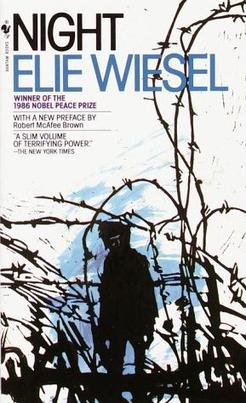 A. Title: Night
A. Title: NightB. Author: Elie Wiesel - 1986 Nobel Peace Prize Winner
C. Publisher: Bantam
D. Genre: Autobiographical, Historical
E. Reading Level: Grades 6+
F. Summary: The narrator, which is Elie Wiesel, is twelve years old when the book starts. The year is 1941, and Elie lives comfortably in the town of Sighet, Transylvania. A few people try to warn the town of Sighet of their impending doom, but no one really pays much attention. In 1944, German troops entered the town and began to set up ghettos for the Jewish people to live in. Soon after the Jews are forced to live in such horrible, cramped conditions, the Nazi's began to ship them off to concentration camps. The Jewish people of Sighet are forced to squish into cattle-cars on a train; eighty people to one cattle wagon. The conditions are beyond inhumane; there are no bathrooms and the people are given no food or water. On board Elie's cattle wagon there is a woman screaming about fires, furnaces, and people burning, but everyone is the car ignores the woman who seems to have gone insane. When the train ride is finally over, they have arrived at Auschwitz, and all they can smell is burning flesh. Right away Elie and his father are separated from the rest of the family, and they lie about their age in order to keep from being further separated. As Elie walks into the concentration camp he is bombarded by the sight of babies being thrown into a massive ditch on fire. Elie is forced to strip down and shower off, get his head shave, get new work clothes, and to get a number; his number is A-7713. Many of the people that were unable to work due to their physical condition were thrown into the crematory. Elie continuously is witness to many terrible events, especially hangings that were common among the prisoners. While at Auschwitz, Elie suffers a foot injury causing him to be sent to the hospital wing and to receive medical treatment. Soon after he begins to recover, the German's decide to move the prisoners due to the approaching troops. The people are forced to walk from one concentration camp to the other in the dead of winter; many do not survive this long, physically draining trip. Both Elie and his father survive the trek by helping each other through it step-by-step. The trek takes them to another train ride where Elie sees a young boy kill his father for his bread and is completely horrified. The new concentration camp he is at is called Buchenweld, and here he watches his father fall ill and eventually die. On April 11, 1945, American tanks roll into Buchenweld to free the remaining prisoners. Elie is transported to a hospital to recover; when he sees himself in the mirror, he swears a corpse is staring back at him.
G. Response: I love any literature that has to do with the holocaust. Night is incredibly vivid, scary, and shocking. I think it has an excellent mixture of story-telling abilities and real-life horror and shock. There is no sugar-coating the horrible things that happened to the Jewish people during World War II and this book doesn't even attempt to. The images are so shockingly real that this book leaves a lasting impression on every one that reads it. Just the thought of throwing babies into a burning ditch is horrific, but imagine if you're a teenager or a young child; how does one even begin to handle that type of emotional trauma. The most realistic and eye-opening part of the whole book is when the boy kills his father for his bread. The simple idea seems ridiculous, but in the situation those people were placed under how ridiculous was it? I'm sure that type of behavior was common due to the living conditions forced upon these people. Every day was a struggle to survive and Night does an amazing job at bringing that reality into the light it deserves. It's so easy to remember something terrible for a generation or two, but this book will leave a mark on every generation that reads it. I will be teaching in a grade that most likely will not be mature enough to handle this book, but regardless of what grade I teach, I think this book should be a requirement for all fifty states curriculum. Plain and simply, this book has the ability to make a difference in this world and those are rare to come across.
H. Teaching Ideas: Obviously, Night is the perfect candidate when it comes to teaching about World War II and/or the Holocaust. The Web English Teacher website has so many Night and Holocaust resources that you may not even need to find other ideas. There are website links that deal with background information regarding the liberation of Buchenwald concentration camp from History.com's "This Day in History" site, a collection of links from the Nobel Archives. Be sure to scroll to the bottom, and an extensive list of links to online sources about several aspects of the Holocaust. Lesson plan links include an entire Holocaust unit project (includes assessment), a project where students create their own Holocaust website, and a poetry unit to remember the Holocaust through poetry. The Holocaust Teacher Resource Center online has a great lesson plan with a pre-reading activity, many discussion questions, additional information about Elie Wiesel, vocabulary, writing topics, and more. A general search in Google produced many great lesson plan ideas; Night is clearly a very classroom friendly novel and an amazing piece of literature on a dark time in human history.

No comments:
Post a Comment